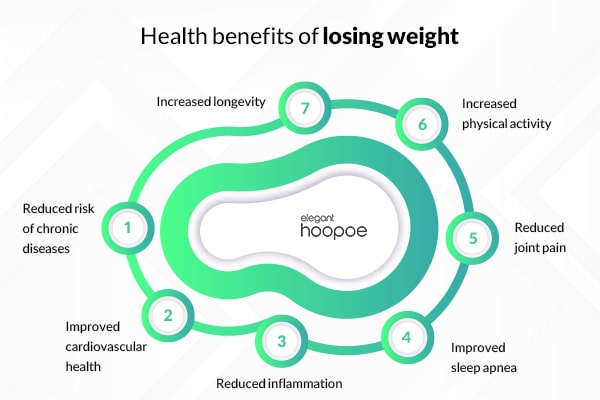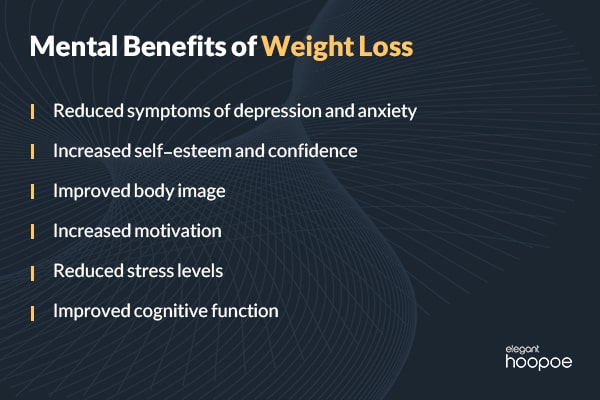Weight loss is a topic that has gained significant attention in recent years due to its potential health benefits. Obesity rates have been on the rise for decades, and carrying excess weight can lead to a variety of health problems. There are numerous benefits of losing weight, both for your physical and mental health and in this article we are going to delve into the world of Weight Loss Benefits for human body and explain how getting rid of those extra fat pockets can help you become a healthier version of yourself.`
We also articulate how it can improve your physical and mental health, increase your energy levels, and enhance your overall quality of life. So, if you’re considering embarking on a weight loss journey, read on to discover the many benefits that await you.
Losing weight is not just about fitting into smaller clothes or achieving an ideal body shape, it has a significant impact on one’s overall health and well-being. In fact, weight loss has been linked to a variety of health benefits, including reducing the risk of chronic diseases such as heart disease, diabetes, and certain cancers. Moreover, losing weight can improve mental health, increase energy levels, and improve the overall quality of life.

Health Benefits of Losing Weight
Losing weight can have numerous physical benefits that can significantly improve overall health and well-being. Here are some of the key physical benefits of weight loss:
- Reduced risk of chronic diseases: As mentioned earlier, losing weight can significantly reduce the risk of chronic diseases such as heart disease, stroke, diabetes, and certain types of cancer. Excess weight can put strain on the body and contribute to the development of these diseases, so losing weight can help reduce the risk.
- Improved cardiovascular health: Losing weight can lower blood pressure and improve cholesterol levels, which can improve overall cardiovascular health. This can help reduce the risk of heart disease, stroke, and other cardiovascular problems. If you are interested to know the benefits if losing weight for blood pressure you can read this article.
- Reduced inflammation: Excess weight can lead to chronic inflammation, which can contribute to a range of health problems. Losing weight can help reduce inflammation levels and improve overall health.
- Improved sleep apnea: Sleep apnea is another common problem for people who are overweight or obese. Losing weight can reduce the severity of sleep apnea and improve overall sleep quality.
- Reduced joint pain: Carrying excess weight can also lead to joint pain and discomfort, as well as problems with mobility. Losing weight can reduce the pressure on your joints and improve overall joint health, leading to less pain and discomfort.
- Increased physical activity: Losing weight can improve your mobility and physical fitness and make it easier to engage in physical activity. This, in turn, can improve overall physical fitness and reduce the risk of chronic diseases.
- Increased longevity: Studies have shown that losing weight can increase lifespan and reduce the risk of premature death. This is likely due to the reduced risk of chronic diseases associated with weight loss.
Suggested article: What are the benefits of weight loss for liver? How can losing weight make your liver healthier.
Overall, losing weight can have a profound impact on your health and wellbeing, leading to a longer, happier, and healthier life.

Mental and Emotional Benefits of Weight Loss
In addition to the physical benefits of weight loss, there are also several mental health benefits. Losing weight can have a positive impact on improved mental health in a number of ways. Here are some of the key mental benefits of weight loss:
Read more: How to get a flat stomach?
- Reduced symptoms of depression and anxiety: Losing weight can improve mood and reduce symptoms of depression and anxiety.
- Increased self-esteem and confidence: Achieving weight loss goals can boost self-esteem and confidence, which can have a positive impact on overall mental health.
- Improved body image: Losing weight can improve body image and reduce negative thoughts and feelings related to body size and shape.
- Increased motivation: Achieving weight loss goals can increase motivation and lead to a more positive outlook on life
- Reduced stress levels: Carrying excess weight can put stress on the body, which can lead to increased stress levels. Losing weight can reduce stress and improve overall mental health.
- Improved cognitive function: Studies have shown that losing weight can improve cognitive function, including memory and focus.
Overall, losing weight can have a significant impact on mental health, improving mood, self-esteem, body image, and reducing stress levels.
Related Post: Can weight loss help with knee pain? what are the benefits of losing weight for your knees?
How weight loss benefits your sexual life?
Losing weight can directly and in-directly improves one’s sex life. Getting rid of fat pockets can ultimately result in increased testosterone for men which will affect their sex drive resulting in better sex drive. On the other hand being overweight is linked to erectile dysfunction for men and multiple studies reported that losing weight can help get rid of that problem in most cases.
Another way losing weight can improve the quality of sexual intercourse is by making orgasms faster and more enjoyable. The reason behind this is that fat cells can gather around blood vessels in genital area and that can slow the blood flow. Losing weight will clear out the fat cells resulting in better blood circulation in genitals.
Other Benefits of Weight Loss
1- Increased Energy Levels
When you carry excess weight, your body has to work harder to move around, and you may feel tired or fatigued more easily. Losing weight can reduce this strain on the body, making it easier to move around and increasing overall energy levels.
Carrying excess weight can also impact sleep quality, which can contribute to feelings of fatigue during the day. Losing weight can improve sleep quality and reduce the severity of sleep apnea, which can lead to better rest and increased energy levels.
In addition to the physical benefits of increased energy levels, there are also mental health benefits. Feeling more energized and alert can improve mood and reduce feelings of depression and anxiety.
2- Better Quality of Life
Losing weight can lead to a better quality of life in a number of ways. Carrying excess weight can impact daily activities, making it more difficult to move around and engage in physical activity. Losing weight can improve mobility and make it easier to participate in daily activities, improving overall quality of life.
Improved self-esteem, body image, and confidence can lead to a more positive outlook on life and increased enjoyment of daily activities.
Reducing the risk of chronic diseases and improving overall health can also contribute to a better quality of life. Chronic diseases can impact daily life, limiting activities and leading to physical and mental strain. Losing weight allowing for a more active and fulfilling life.
3- Improved Fertility
Weight loss can also improve fertility in both men and women. Carrying excess weight can disrupt hormone levels, which can impact fertility. In women, excess weight can cause irregular periods and reduce fertility, while in men it can lead to reduced sperm quality and quantity.
Losing weight can help regulate hormone levels, which can improve fertility in both men and women. Studies have shown that weight loss can improve ovulation and increase the chances of conception in women. In men, losing weight can improve sperm quality and quantity, increasing the chances of successful fertilization.
Weight loss can also improve the success rates of fertility treatments such as in vitro fertilization (IVF). Studies have shown that women who are overweight or obese have lower success rates with IVF, and losing weight can improve these rates.
4- Reduced Risk of Certain Cancers
Carrying excess weight can increase the risk of several types of cancer, including breast, colon, endometrial, kidney, and pancreatic cancer.
One way that excess weight can increase cancer risk is by causing chronic inflammation in the body, which can lead to DNA damage and cancer development. Additionally, excess weight can cause hormonal imbalances, which can contribute to the development of certain cancers.
Losing weight can reduce the risk of these cancers by reducing chronic inflammation and regulating hormone levels. Studies have shown that weight loss can significantly reduce the risk of breast and colon cancer, and may also reduce the risk of other types of cancer.
5- Increased Longevity
Weight loss can increase longevity, or the length of time a person is expected to live. Carrying excess weight has been linked to a higher risk of several chronic diseases, including heart disease, diabetes, and certain types of cancer, all of which can impact lifespan.
You might also like: What are benefits of weight loss for diabetes?
Losing weight can reduce the risk of these chronic diseases, improving overall health and increasing longevity. In addition, weight loss can improve cardiovascular health, reducing the risk of heart disease and stroke, which are leading causes of death.
Studies have also shown that weight loss can improve overall quality of life, which can contribute to increased longevity. Improved physical health, mental wellbeing, and mobility can all help individuals live longer and enjoy a higher quality of life.
6- Improve memory
Weight loss has also been linked to improved memory and cognitive function. Excess weight has been shown to have negative effects on cognitive function, including memory, attention, and processing speed.
Losing weight can improve cognitive function by reducing inflammation in the brain and improving blood flow to the brain. Studies have shown that weight loss can lead to improved memory and cognitive function in overweight and obese individuals.
In addition, weight loss can also reduce the risk of age-related cognitive decline, including dementia and Alzheimer’s disease. By reducing inflammation and improving cardiovascular health, weight loss can protect the brain from damage and improve cognitive function in older adults.
7- Improve relationships
Weight loss can also improve relationships, both with oneself and with others. Carrying excess weight can negatively impact self-esteem and self-confidence, which can affect relationships with others. Losing weight can improve self-esteem and confidence, leading to better relationships with oneself and others.
In addition, weight loss can also lead to improved physical health and increased energy levels, which can improve social interactions and allow individuals to participate in activities they may have previously avoided due to weight-related insecurities.
8- Ease of pregnancy
Weight loss can make pregnancy easier and safer for both the mother and the baby. Carrying excess weight during pregnancy can increase the risk of several complications, including gestational diabetes, preeclampsia, and preterm birth.
Losing weight before pregnancy can reduce the risk of these complications and improve overall pregnancy outcomes. In addition, weight loss can increase fertility and reduce the risk of miscarriage, making it easier for women to become pregnant.
During pregnancy, weight loss is not recommended, but maintaining a healthy weight can still have significant benefits. Women who are overweight or obese before pregnancy are often advised to gain less weight during pregnancy to reduce the risk of complications. By maintaining a healthy weight before and during pregnancy, women can improve their own health and the health of their baby.
How to lose weight after pregnancy? Full guide to get back your desired body shape after child birth.

9- An effective treatment for depression and improve overall mental health
Weight loss can also be an effective treatment for depression and improve overall mental health. Excess weight has been linked to an increased risk of depression and other mental health conditions, including anxiety and stress.
Losing weight can improve mental health by reducing inflammation in the brain, improving neurotransmitter function, and increasing the production of mood-boosting hormones. Studies have shown that weight loss can lead to significant improvements in depressive symptoms, as well as improvements in overall mental health and quality of life.
In addition, weight loss can also improve self-esteem and confidence, which can have a positive impact on mental health. By feeling better about oneself and achieving weight loss goals, individuals may feel more confident in their abilities and more motivated to engage in positive behaviors, leading to further improvements in mental health.
10- Changes in the taste of food
Studies have shown that losing weight can alter taste preferences and increase sensitivity to certain flavors. One reason for this change in taste preferences is that excess weight can lead to changes in the structure and function of taste buds, which can affect how food tastes. Losing weight can reverse these changes and improve taste sensitivity, making food taste better.
In addition, weight loss can also lead to changes in food preferences and eating habits. By adopting healthier eating habits, individuals may begin to enjoy healthier foods and find that they no longer crave unhealthy foods.
11- Newfound enjoyment of sports and physical activity
Carrying excess weight can make physical activity more difficult and uncomfortable, leading to a dislike of exercise and a sedentary lifestyle.
Losing weight can improve physical fitness and stamina, making it easier to engage in physical activity and enjoy sports. As individuals become more active, they may also experience improvements in mood and energy levels, leading to a greater enjoyment of physical activity.
In addition, weight loss can open up new opportunities for physical activity and sports. As individuals become more fit and lose weight, they may be able to participate in sports and activities that were previously too difficult or uncomfortable.
12- Reduce arthritis symptoms
Arthritis is a condition characterized by inflammation of the joints, which can cause pain, stiffness, and reduced mobility. Excess weight can increase the load on the joints, leading to increased inflammation and worsening of arthritis symptoms.
We already have explained how losing weight can help alleviate the symptoms of arthritis in another post, so if you are interested read more on ” Is weight loss good for arthritis? ”
Losing weight can reduce the load on the joints and improve joint function, leading to a reduction in arthritis symptoms. In addition, weight loss can also improve overall physical fitness and reduce inflammation throughout the body, which can further improve arthritis symptoms.
Studies have shown that even modest weight loss can lead to significant improvements in arthritis symptoms, including reduced pain, improved mobility, and better overall quality of life. By adopting a healthy diet and engaging in regular physical activity, individuals can reduce the load on their joints and improve their arthritis symptoms.
13- Reduction in healthcare costs
Carrying excess weight can increase the risk of a range of health conditions, including diabetes, heart disease, and certain cancers, which can require expensive medical treatments and interventions.
By losing weight and improving overall health, individuals can reduce their risk of these conditions and associated healthcare costs. In addition, weight loss can also lead to a reduction in medication use, further reducing healthcare costs.
Studies have shown that weight loss interventions, such as lifestyle changes and bariatric surgery, can lead to significant reductions in healthcare costs. One study found that bariatric surgery resulted in an average cost savings of over $20,000 per patient over a five-year period.
By adopting a healthy lifestyle and losing weight, individuals can improve their overall health and reduce their healthcare costs. This can have a significant impact on their financial wellbeing, as well as their physical and mental health.
14- Success in work
Excess weight can have a negative impact on self-esteem and confidence, which can in turn affect job performance and career success. Carrying excess weight can also lead to fatigue and reduced energy levels, which can make it difficult to focus and be productive at work.
Losing weight and improving overall health can lead to improved self-esteem and confidence, which can have a positive impact on job performance and career success. In addition, weight loss can improve energy levels and reduce fatigue, leading to increased productivity and better job performance.
Studies have shown that weight loss can lead to improved job performance and increased career success. One study found that individuals who lost weight through a workplace weight loss program reported increased job satisfaction, improved work performance, and increased likelihood of promotion.
15- Improve eye vision
While weight loss itself may not directly improve eye vision, adopting a healthy lifestyle and maintaining a balanced diet can have a positive impact on overall eye health. By eating a diet rich in healthy foods and staying active, individuals can improve their overall health and reduce the risk of eye diseases and vision problems.
Conclusion
In conclusion, weight loss can have a multitude of benefits, ranging from physical and mental health improvements to increased longevity and improved quality of life. Losing weight can reduce the risk of chronic diseases, improve mental health, increase energy levels, and improve overall wellbeing.
The physical benefits of weight loss include improved heart health, reduced risk of diabetes, improved sleep quality, and increased fertility. Additionally, weight loss can have a positive impact on mental health, improving mood, reducing symptoms of depression and anxiety, and boosting self-esteem and confidence.
Other benefits of weight loss include improved memory, better relationships, reduced arthritis symptoms, and even success in work. By adopting a healthy lifestyle and losing weight, individuals can improve their overall health and wellbeing, and achieve success in all areas of their lives.
Overall, weight loss is a positive and transformative journey that can lead to significant improvements in physical and mental health, as well as increased longevity and overall wellbeing. By making small, sustainable changes to their lifestyle, individuals can achieve their weight loss goals and experience the many benefits that come with a healthy weight.







